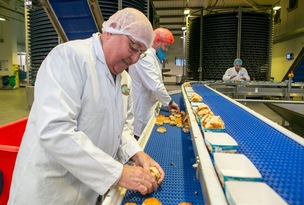JOB creation experts in Barnsley have been accused of ‘desperation’ by the Campaign to Protect Rural England after redrawing a projection which would see more than half new employment created in the land-hungry logistics and warehousing sector in the years ahead.
Barnsley Council is in the process of having its forthcoming Local Plan, which will become the benchmark for planning policy until 2033, scrutinised by a government planning inspector.
Planners have been forced to redraw some of the detail after inspector Sarah Housden raised a concern they were not allowing for enough new homes to be built to meet the demand from those who would take new jobs the council expect to see created.
The result was council staff recalculating projected job creation levels, with expected numbers of new jobs dropping from 33,000 over the course of the plan, to just under 29,000 by implication reducing the number of new homes which would be needed.
They also tweaked their expectations for the types of jobs expected and although the overall amount of land earmarked to be given over to employment remains the same, sites allocated for office and industrial use have both been reduced, while the proportion of land for warehousing and logistics the distribution of goods has grown from a previously predicted 43 per cent of all new land taken to create jobs, to a new figure of 52.9 per cent.
Andrew Wood, appearing at an examination hearing before Mrs Housden, said: “We know that in the emerging plan for Doncaster they are anticipating 36 per cent of jobs growth being warehousing and logistics.
“It seems like a massive case of putting all your eggs in one basket.
“This is the type of employment with the biggest take of land, per job.
“Barnsley is chasing the same jobs as Doncaster and Wakefield, which have a head start.
“It is not an employment strategy, it is desperation.”
Gary Salter, appearing on behalf of a group campaigning to keep a large swathe of green belt land between Pogmoor and Barugh Green from development also questioned whether taking land from the green belt to be given over to logistics developments could be justified.
Barnsley Council’s head of planning, Joe Jenkinson, defended the council’s strategy and the way it had calculated its expected jobs growth.
Wakefield was now running out of sites for that type of commercial development, he said.
“Doncaster are rapidly seeing their sites come forward. It is true to say Barnsley is lagging behind, because we don’t have the sites.
“Barnsley represents quite an obvious location nationally for a logistics centre.”
During the hearing, the council was accused of adjusting its expectations for new jobs only because that would impact on its need to provide sites for new housing.
Mr Jenkinson accepted that it would have been possible to do that, but denied Barnsley Council had done so: “If we were wanting to be really cynical and bring the housing figure down, there are ways to pull different levers,” he said.
“We have tried to create some balance between need and reality; where Barnsley is economically.”
The hearing sessions will continue over several days, with the inspector releasing her findings later.




























